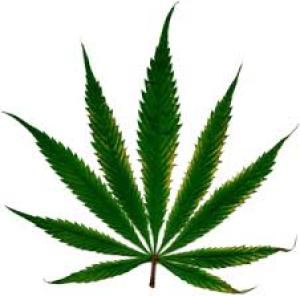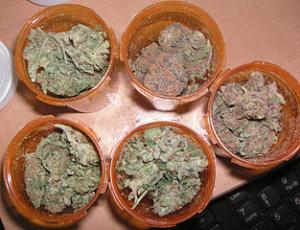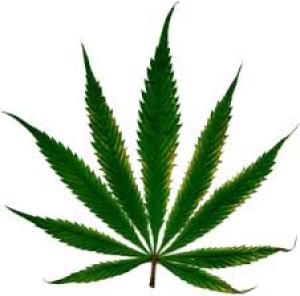The Vermont senate and Democratic presidential contender has unveiled a bill to federally deschedule -- not reschedule -- marijuana.
Everybody who's anybody in drug policy reform is going to be there. You should be, too.
It's one of the wackiest weed laws on the books.
The Senate approves a bill to ease medical marijuana access for vets, medical marijuana sales begin in Illinois, New Jersey's governor signs a medical marijuana school access bill, and more.
This week, we have a crooked jail and prison guard trifecta and a Border Patrol agent caught up with the Gulf Cartel.
Bernie Sanders makes Senate history with the first bill in that chamber to end pot prohibition, the DEA head badmouths medical marijuana, the Mexican Supreme Court issues a historic ruling on the human right to use and grow marijuana, and more.
It's all marijuana-related news today, with medical marijuana sales starting Monday in Illinois, the State Department saying it can live with pot legalization in other countries, the Houston DA implementing a marijuana diversion program, and more.
Democratic presidential contenders stake out positions on marijuana, a South Dakota Indian tribe suspends its pot operations, Illinois medical marijuana sales began today, Maine's Tea Party governor threatens to call out the National Guard to fight heroin, and more.
Initiatives aimed at next year are advancing, New Jersey's governor signs a medical marijuana access bill, Mexico's marijuana debate is about to heat up, and more.
Decriminalization spreads in South Florida, DC marijuana arrests hit historic lows, the Senate passes a spending bill that should ease vets' access to medical marijuana, there are calls for the DEA chief's head after he said medical marijuana was "a joke," and more.
Vermont independent senator and Democratic presidential contender Bernie Sanders Wednesday filed legislation in the Senate that would end federal marijuana prohibition by removing -- not rescheduling -- marijuana from the list of federally controlled substances. It is the first bill ever introduced in the Senate to end the federal war on marijuana.

Bernie Sanders (wikipedia.org)
A similar bill was introduced in the House by Reps. Barney Frank (D-MA) and Ron Paul (R-TX) in 2011, but it never went anywhere.
Two years later, Rep. Jared Polis (D-CO) provided a model for the Sanders bill with a bill he proposed in 2013, and reintroduced this year as the Regulate Marijuana Like Alcohol Act (HR 1013), although there are slight differences. The Polis bill would shift authority over marijuana from the DEA to the Bureau of Alcohol, Tobacco and Firearms, while the Sanders bill would not, and the Polis bill would amend federal alcohol laws to include provisions for shipping marijuana, while the Sanders bill would not.
"Just as alcohol prohibition failed in the 1920s, it's clear marijuana prohibition is failing today," Polis said in a statement. "For decades, the federal ban on marijuana has wasted tax dollars, impeded our criminal justice system, lined the pockets of drug cartels, and trampled on states’ ability to set their own public health laws. Today's introduction of the Ending Federal Marijuana Prohibition Act in the Senate is a huge step forward in the movement to enact the commonsense drug laws needed to grow our economy and restore fairness to our justice system."
Sanders filed the bill one week after he first proposed reclassifying marijuana during a campaign speech at George Mason University.
"In the United States we have 2.2 million people in jail today, more than any other country. And we're spending about $80 billion a year to lock people up. We need major changes in our criminal justice system -- including changes in drug laws," Sanders said. "Too many Americans have seen their lives destroyed because they have criminal records as a result of marijuana use. That's wrong. That has got to change."
No other presidential contender, Democratic or Republican, has staked out a position as advanced on marijuana legalization as Sanders, although Congress is proving increasingly receptive to marijuana reform measures.
Several spending amendments aimed at blocking federal pursuit of state-legal marijuana operations have already passed the House and the Senate Appropriations Committee this year, and Senate Republicans have included spending amendments in their recent "minibus" spending package, including measures to bar the DEA from interfering with state medical marijuana laws, bar the Treasury Department from stopping banks from providing services to marijuana business, and to require the Veterans Administration to allow vets to use medical marijuana.
Also, earlier this year, Sens. Corey Booker (D-NJ), Kirsten Gillibrand (D-NY), and Rand Paul (R-KY) introduced the CARERS Act (S. 683), which would legalize the medicinal use of marijuana.
The increasing acceptance of marijuana reforms in Congress comes as the American public also increasingly accepts the idea. Public opinion polls now consistently show majority support for pot legalization, including a Gallup poll last month that had 58% for legalization.
Marijuana reformers are liking what they are hearing from the Sanders camp.
"The science is clear that marijuana is less harmful than alcohol, and that should be reflected in our nation's marijuana policy," said Mason Tvert, communications director for the Marijuana Policy Project. "Sen. Sanders is simply proposing that we treat marijuana similarly to how we treat alcohol at the federal level, leaving most of the details to the states. It is a commonsense proposal that is long overdue in the Senate."
"Clearly Bernie Sanders has looked at the polls showing voter support for marijuana legalization," said Michael Collins, deputy director of national affairs for the Drug Policy Action, the political arm of the Drug Policy Alliance. "Marijuana reform was already moving forward in Congress but we expect this bill to give reform efforts a big boost."

Will Congress act to end federal pot prohibition? (wikimedia.org)
"Many legislators and citizens are still hesitant to move forward with marijuana legalization initiatives in their home states because of the federal ban, which may contradict state law, making both laws difficult to follow or enforce, and making banking transactions all but impossible." said Maj. Neill Franklin (Ret.), executive director for Law Enforcement Against Prohibition (LEAP), a criminal justice group working to legalize marijuana.
Four states -- Alaska, Colorado, Oregon, and Washington -- and the District of Columbia have already legalized marijuana, with another handful expected to do so next year. And 23 states already have medical marijuana laws.
"As more states legalize marijuana for medical or non-medical use the pressure to change federal law will continue to grow," Bill Piper, director of national affairs at Drug Policy Action said. "There is a clear bipartisan majority in Congress for letting states set their own marijuana policies."
(This article was prepared by StoptheDrugWar.org's lobbying arm, the Drug Reform Coordination Network, which also pays the cost of maintaining this web site. DRCNet Foundation takes no positions on candidates for public office, in compliance with section 501(c)(3) of the Internal Revenue Code, and does not pay for reporting that could be interpreted or misinterpreted as doing so.)
back to top
This article was produced in collaboration with AlterNet and first appeared here.
The world's premier drug policy reform conference is set for next week in suburban Washington, DC. Hosted by the Drug Policy Alliance, the 2015 International Drug Policy Reform Conference will bring well over a thousand experts and advocates together beginning next Wednesday evening and going through next Saturday evening.

Drug Policy Alliance head Ethan Nadelmann provides a stemwinder keystone speech. (osi.org)
People will be attending from around the country and around the planet, and the conference will be covering international as well as domestic drug policy concerns.
This year's conference couldn't come at a more exciting and propitious time for drug policy reform: Marijuana legalization is on the march in the US and across the world, outrageous drug sentences in the US are starting to be undone, the UN General Assembly Special Session on Drugs is set for next year, the global prohibitionist consensus is crumbling, and a more enlightened future awaits -- if we can get there from here.
And that's what the conference is about: effecting change. Attendees will be hearing from experts not only in science, medicine, and law, but also from the activists and elected and appointed officials who have successfully made reform happen.
The conference will feature a live national town hall exploring the intersections between drug reform and the Black Lives Matter movement, documentary film screenings, tours of Washington, DC's drug war history, three dozen community-based sessions, and too many panels for any one human to attend in person. (thankfully, DPA will be recording all the sessions for future reference.)
Here's just a taste of what's in store:
Ensuring Inclusion, Repairing Damage: Diversity, Equity and the Marijuana Industry
- This roundtable will focus on how the war on drugs has harmed multiple generations through criminalization and mass incarceration. As marijuana legalization efforts move forward, who will control the industry and what will be the barriers to entry? Most importantly, how can the "green rush" be a road to repair for the traditionally marginalized and underserved?

How could weed not be on the agenda?
- Despite marijuana's broad and growing social acceptance, marijuana law violations make up almost half of all drug arrests nationally. Because of this, marijuana legalization is often touted as the first step toward dismantling the war on drugs, but legalization advocates often distinguish the substance from other illicit drugs. With this in mind, how can marijuana legalization further the movement to decriminalize other drugs?
The Drug War and the Militarization/Bastardization of the Police
- Even though some communities have always known police brutality, issues of impunity of action and corruption are now touching upon the mainstream like never before. Supported by lawmakers and the judiciary, the police have become militarized and bastardized. What has caused the condoning of an ever increasing violent police force and how has the politics and violence of the drug trade and the drug war directly assisted with this phenomenon?
MDMA and Other Psychedelics: What Does Legal Access Look Like?
- We all agree that criminalization of all drugs needs to end, and marijuana legalization has provided one model for that. Public and political support for moving immediately to the same model for other drugs is low -- so in what other ways can we end criminalization and create legal access for MDMA and other psychedelic drugs? What would a medical model look like? Would a spiritual model using approved guides work for something like ayahuasca? What about licensing users or specific venues? And would any of these models show promise for drugs with addiction potential like cocaine, methamphetamine or heroin?
Reform For Those Who Sell Drugs: The Third Rail of Drug Policy Reform
- This roundtable will broach the subject of advocating for drug sellers. As we look to minimize the use of the criminal justice system where drug policy is concerned, how do we distinguish the drug dependent subsistence dealer and the more common mid-level drug dealer who's not dependent? Does compassion and the public health approach extend to those who sell drugs?
The Future of Digital Spaces, Drug Sales and Drug Policy
- Shutting down the Silk Road and sentencing Ross Ulbricht to life in prison not only failed to end global online drug transactions, but actually led to having more digital drug marketplaces today than ever before. Join leading experts to discuss the benefits and risks of this new model of drug sales and how they can be used to help end the war on drugs.
Supervised Injection Facilities
- Supervised injection facilities (SIFs) have been a crucial part of harm reduction initiatives allowing people to consume illicit drugs in a supervised, often clinical space. However, questions remain concerning the advantages SIFs offer and their role in addressing the HIV epidemic among people who use drugs. This session will cover campaigns and strategies, both in the United States and internationally.

There will be sessions on psychedelics. (wikimedia.org)
- From Bob Dylan to Nina Simone, Paul Robeson and Harry Belafonte, successful American artists have traditionally played a leading role in addressing social and political issues of their time. Have political activism and America's pop culture parted ways? If the criminal justice system is today's civil rights issue, what will it take to engage a cadre of pop artists who fully embrace art as politics?
Criminalized, Marginalized and "Othered": Lessons and Strategies for Fighting the Drug War in Hard Places
- This roundtable will focus on the diverse demographics among drug users. From pregnant women to individuals in LGBT circles and HIV-affected communities, what strategies are working and what can our movement learn about organizing with criminalized, marginalized and transient constituencies? How do we build a more robust movement that addresses the challenges and concerns of those least visible and most vulnerable to drug war policies?
What Does Drug Education and Prevention Look Like in the Age of Marijuana Legalization?
- Despite successful marijuana legalization campaigns in Colorado, Washington, and the District of Columbia and California's potential legalization vote in 2016, the rhetoric of "Reefer Madness" type messages are being renewed even though recent studies show that teen marijuana use is falling as more states legalize it. This discussion will bring together drug education and prevention experts to highlight the current research findings and map out a path for effective drug education and prevention in the age of legalization.
United Nations: What's the Opportunity?
- The UN General Assembly Special Session (UNGASS) on Drugs is less than a year away. This gathering presents an immense opportunity to build international momentum to end the war on drugs and highlight countries that have taken significant steps in implementing sensible drug laws. This roundtable will focus on the set of "outside game" strategies taking place and ways in which UNGASS can advance the drug policy movement's common agenda.
Are the Party Kids Any Safer Yet? EDM Festivals, the Music Industry and Harm Reduction
- Festival event producers are in a tough spot: always trying to balance demands for "zero tolerance" drug-free events versus trying their best to prepare for attendees who will use drugs. How are festivals starting to integrate drug education and onsite harm reduction services to keep their attendees safe? What challenges and limitations still remain? Will a national effort to change federal RAVE Act legislation clear the path? What more could be done?
E-Cigs and the Future of Maintenance Therapies
- Electronic cigarettes have been the center of considerable controversy between those who see them as a public health threat and those who see them as a valuable harm reduction tool. This roundtable will discuss e-cigs as an alternative source of nicotine for those who c annot or will not quite smoking traditional cigarettes and whether these devices could herald a new era of maintenance therapies or a new era of cracking down on them.
See you there!
back to top
This article was produced in collaboration with AlterNet and first appeared here.
South Dakota's
Flandreau Santee Sioux Tribe
announced over the weekend that it was suspending operations on its marijuana resort set to open on New Year's Eve and that it had burnt its pot crop. The tribe said it was seeking "clarification" from the Justice Department to ensure "the continued success of the marijuana venture."
The move comes as at least three other Indian tribes that have embarked on marijuana operations after the Justice Department seemingly gave them a green light last year have been raided by the DEA, a Justice Department agency. At this point, Indian tribes have reason to be nervous about what the federal stance really is.
But the Flandreau pot operation also drew fast and intense opposition from the state's Republican political establishment and law enforcement figures. And that opposition has brought renewed attention to one of the most bizarre state marijuana laws in the land, South Dakota's "internal possession" law.
As Republican state Attorney General Marty Jackley warned -- twice -- when the tribe announced its plans in June, "South Dakota law prohibits the internal and physical possession, distribution, and manufacture of marijuana by: (1) all non-Indian persons anywhere in South Dakota including within Indian country; (2) all persons, including tribal members, outside of Indian Country."
The sheriff and prosecutor of Moody County, where the Flandreau reservation is located, reiterated Jackley's point.
"Bottom line," said Sheriff Troy Wellman, "if you're non-native, it's illegal for you to have marijuana in your system, regardless of whether you're on tribal ground."
"If you are a non-tribal member that goes over onto that property and ingests marijuana in any form, you are breaking the laws in the state of South Dakota," Moody County State's Attorney Paul Lewis added.

If you do this in Denver, it get could get you busted in Deadwood.
They're not kidding. Under a state law passed in 2001 and
upheld by the state Supreme Court in 2004, you can be arrested, tried, and convicted for having marijuana in your system, even if you ingested it in another state or country (or Indian reservation).
Someone who legally smokes marijuana in Colorado and then drives across the prairie to South Dakota can be charged with the crime of having smoked marijuana elsewhere. It's the same for medical marijuana patients in states bordering South Dakota. Someone who holds a Minnesota or Montana medical marijuana card, uses his medicine, and then travels to South Dakota can be charged with the crime of having medicated where it is legal.
Here is the law:
22-42-15. Ingesting substance, except alcoholic beverages, for the purpose of becoming intoxicated as misdemeanor--Venue for violation. Any person who intentionally ingests, inhales, or otherwise takes into the body any substance, except alcoholic beverages as defined in § 35-1-1, for purposes of becoming intoxicated, unless such substance is prescribed by a practitioner of the medical arts lawfully practicing within the scope of the practitioner's practice, is guilty of a Class 1 misdemeanor. The venue for a violation of this section exists in either the jurisdiction in which the substance was ingested, inhaled, or otherwise taken into the body or the jurisdiction in which the substance was detected in the body of the accused.
A Class 1 misdemeanor in South Dakota is punishable by up to a year in jail and/or a $2,000 fine. That's the same penalty as for simple marijuana possession.
Note that the law specifically allows for prosecuting people for internal possession either where they ingested the substance or where it was detected.
It's not that the cops in South Dakota are randomly accosting passersby and demanding they submit to drug tests -- probable cause is needed -- but what typically happens is that someone is arrested and police then intimidate him into consenting to a urine drug test during booking. The person is then hit with another criminal charge -- internal possession -- providing more leverage for prosecutors during plea negotiations.
"The cops took me downtown and said if I didn't piss for them, they'd stick something in my dick and take it by force," Huron resident Dave Johnson said of his 2003 internal possession bust. "They were going to take it forcefully -- that's what they told me. So I said okay."
That's still how it works. People being booked into jails are told they need to provide a urine test, and if they demur, they are threatened with a court order and the prospect of forced drug testing. Of course, consenting to such drug tests makes it impossible for defense attorneys to challenge them in court, but agreeing to be tested means not only is the prospect of a forced drug test avoided, but also that the defendant will likely be booked and released instead of being held until he can appear before a judge for a warrant hearing.

Get popped for pot possession in South Dakota and count on getting popped for "internal possession," too. (wikimedia.org)
"I defend a lot of drug cases,"
said Huron attorney Ron Volesky, "and I've defended several of these urine sample cases, but I haven't yet seen an instance where we could challenge a court order because everyone has voluntarily consented. As a practical matter, when the police pick someone up they say, 'Look, we can do it the hard way or the easy way; you can voluntarily consent because we have probable cause, or we can wake up the judge, have him sign an order, and take you down and have you catheterized.' They basically threaten you," said
Volesky.
While South Dakota residents are the most frequent victims of the state's internal possession law, it could happen to anyone, especially visitors unaware of the law. And they don't even have to get arrested for something to face a possible prosecution. Imagine you're a medical marijuana patient visiting Rapid City for a shopping trip and your car gets T-boned by a drunk driver who runs a red light. Hospitals routinely test the blood of accident victims. Congratulations, you've just become a criminal.
South Dakota, where you can get busted for something you did legally elsewhere. Probably not a slogan the state tourism board is going to select anytime soon.
back to top
The Senate approves a bill to ease medical marijuana access for vets, medical marijuana sales begin in Illinois, New Jersey's governor signs a medical marijuana school access bill, and more.
NationalOn Tuesday, the Senate approved a bill allowing veterans access to medical marijuana. The Senate Tuesday passed the FY2016 Military Construction and Veterans Affairs Appropriations Bill, which includes language that will allow vets to access medical marijuana in states where it is legal. The Veterans Administration had barred VA doctors from issuing medical marijuana recommendations to vets, but this bill will block the VA from spending money to punish vets who use medical marijuana and allow VA doctors to recommend it where it is legal. The language was first approved as an amendment in May; that amendment must now be approved by the House.
Also on Tuesday, calls to fire the DEA head for calling medical marijuana "a joke" grew louder. Led by Tom Angell at Marijuana Majority, medical marijuana supporters are calling on President Obama to fire DEA Administrator Chuck Rosenberg in the wake of his recent comments calling medical marijuana "a joke." "My mom is a legal patient in Rhode Island, and she uses medical marijuana to deal with the severe pain she experiences from multiple sclerosis," said Angell. "Medical cannabis is no joke to my family or the millions of other American families who have seen its real benefits." Angell has organized a Change.org petition that anyone can sign.
California
On Tuesday, the Newport Beach city council approved a ban on medical marijuana activities in the city. The unanimous vote was on a first reading of the ordinance, which would ban cultivation, as well as dispensaries and delivery services.
Illinois
On Monday, medical marijuana retail sales began in the state. The state's first dispensaries opened for business today after state regulators last week gave the go-ahead to producers to start shipping product to them. Up to eight dispensaries were expected to be open today, including several in the Chicago area. But some patients were turned away because their customer registrations with individual dispensaries had not yet been processed.
Minnesota
On Tuesday, pain patients called for access to medical marijuana. Pain patients pleaded with Health Commissioner Ed Ehlinger to override a panel of health experts who rejected allowing medical marijuana for chronic pain and allow them to use it. For more than three hours, the commissioner heard from a cavalcade of people who said they wake in pain, spend their days in pain, and spend sleepless nights because of pain. "All of this has been very helpful. It's not going to be an easy task weighing the data, weighing the input, weighing the pros and cons, weighing the risks and benefits," he said. "But that's the job I signed up for. I take it very seriously, both as a physician, as health commissioner and as a person who lives in this state." He has until the end of December to make a decision.
Michigan
Last Thursday, fired medical marijuana patients learned they can get unemployment benefits. The state Supreme Court has refused to hear an appeal from the Unemployment Insurance Agency in a case involving people who won unemployment benefits after being fired for medical marijuana use. That means that people who are registered patients who got fired after failing drug tests for marijuana will continue to be eligible for unemployment benefits.
New Hampshire
Last Wednesday, a lung cancer patient sued to get a medical marijuana card. Linda Horan, who suffers from late stage lung cancer, has filed a lawsuit against the state health commissioner in a bid to get a medical marijuana card before dispensaries open next year. The state passed a medical marijuana law two years ago, but won't issue patient ID cards until dispensaries are authorized to start selling medical marijuana next year. Horan wants her card issued now so she can obtain medical marijuana in Maine, which will serve patients from other states.
New Jersey
On Monday, the governor signed a medical marijuana school access billl. Gov. Chris Christie (R), a GOP presidential contender, signed into law Assembly Bill 4587, which requires schools providing services for the developmentally disabled to adopt policies that allow for the administration of medical marijuana to qualified patients.
New York
On Tuesday, medical marijuana patients demanded the governor sign an emergency access bill. Patients, families, and advocates rallied outside Governor Andrew Cuomo's (D) Manhattan office to urge him to sign a bill that would expedite access to medical marijuana for critically ill patients. In June, with overwhelming bipartisan support, both houses of the legislature passed A.7060 (Gottfried) / S.5086 (Griffo), directing the state to establish a program to help critically ill patients obtain emergency access to medical marijuana as soon as possible. The bill was delivered to Governor on October 30th. He has until tomorrow to sign or veto the bill; if he does neither, it will become law.
On Wednesday, Cuomo signed the bill.
South Dakota
On Monday, medical marijuana petitioners handed in signatures. Petitioners with New Approach South Dakota turned in some 16,000 raw signatures Monday, the deadline for initiatives hoping to qualify for the 2016 general election. They need 13,871 valid signatures to qualify, so there is very little room for invalidated signatures if the effort is to make it.
[For extensive information about the medical marijuana debate, presented in a neutral format, visit MedicalMarijuana.ProCon.org.]
back to top
This week, we have a crooked jail and prison guard trifecta and a Border Patrol agent caught up with the Gulf Cartel. Let's get to it:
In Camden, New Jersey, a Camden County jail guard was arrested last Wednesday on charges he used a law enforcement secure database to unlawfully get information about a drug investigation. Jamall Danford, 39, is charged with second degree official misconduct and was jailed on $75,000 bail.In Hebronville, Texas, a Border Patrol agent was arrested last Thursday on drug possession charges that have now morphed into murder charges. Agent Joel Luna was arrested after a raid on a relative's house turned up drugs, guns, and $90,000 in cash. Investigators say he took bribes from the Gulf Cartel to wave through vehicles carrying drugs. He now also faces capital murder and organized crime charges after being linked to the mutilation murder of Jose Francisco Palacios Paz, whose decapitated body was found floating in Laguna Madre Bay in March.
In Live Oak, Florida, a state prison guard was arrested last Thursday on charges she smuggled drugs into the Suwannee Correctional Institution. Guard Alice Edwards faces felony counts of introducing contraband into a state correctional institution and unlawful compensation by a public official.
In Ashville, Alabama, a state prison guard was arrested Tuesday for allegedly trying to bring drugs into the St. Clair Correctional Facility. Guard Stacy Bernard Brown is charged with promoting prison contraband, possession of marijuana, and possession of a controlled substance. He was arrested at work and taken from the prison to the St. Clair County Jail.
back to top
Bernie Sanders makes Senate history with the first bill in that chamber to end federal marijuana prohibition, the DEA head badmouths medical marijuana, the Mexican Supreme Court issues a historic ruling on the human right to use and grow marijuana, and more.
Marijuana PolicyBernie Sanders Files Bill to End Federal Marijuana Prohibition. Vermont independent senator and Democratic presidential contender Bernie Sanders Wednesday filed legislation in the Senate that would end federal marijuana prohibition by removing -- not rescheduling -- marijuana from the list of federally controlled substances. It is the first bill ever introduced in the Senate to end the federal war on marijuana. The bill, the Ending Federal Prohibition Act of 2015, has not yet been assigned a bill number, but the text is available here. Click on the title link to read our feature story.
Nebraska's Omaha Tribe Voices Support for Legal Marijuana Operations. Members of the Omaha tribe voting in a referendum Tuesday supported moving toward legal marijuana operations on the reservation. Some 78% said they supported medical marijuana, 67% said they supported industrial hemp, and 59% said they supported recreational use. The Omaha tribal council will now vote on all three questions, using the referendum as guidance.
Medical Marijuana
DEA Head Calls Medical Marijuana "A Joke." DEA Administrator Chuck Rosenberg Wednesday rejected smoking marijuana as a medicine. It's "a joke," he said. "What really bothers me is the notion that marijuana is also medicinal -- because it's not," Rosenberg said in a briefing to reporters. "We can have an intellectually honest debate about whether we should legalize something that is bad and dangerous, but don't call it medicine -- that is a joke."
Asset Forfeiture
Wyoming Legislative Committee Waters Down Reform Effort. The Joint Judiciary Committee Wednesday rejected a bill that would have ended civil asset forfeiture in favor of another bill that would require a judge to decide within 30 days whether a seizure was appropriate and to hold a hearing within 120 days. Earlier this year, the legislature passed a bill ending civil asset forfeiture, only to see it vetoed by Gov. Matt Mead (R).
Drug Testing
Wisconsin to Start Drug Testing Welfare Recipients Monday. Drug testing for some welfare recipients begins next week after Gov. Scott Walker (R) signed off on a rule from the Department of Children and Families requiring able-bodied adults to be screened for drug use before seeking benefits. "Employers across the state frequently tell me they have good-paying jobs available in high-demand fields, but need their workers to be drug-free," Walker said in a statement. "These important entitlement reforms will help more people find family-supporting jobs, moving them from government dependence to true independence."
International
Mexican Supreme Court Rules People Have the Right to Grow and Use Marijuana. In a decision that could open the door to pot legalization south of the border, the Mexican Supreme Court ruled Wednesday that individuals have the right to use and grow the plant. The decision does not undo Mexico's marijuana laws, but does open the door for a wave of legal actions that could end in their being rewritten.
(This article was prepared by StoptheDrugWar.org's lobbying arm, the Drug Reform Coordination Network, which also pays the cost of maintaining this web site. DRCNet Foundation takes no positions on candidates for public office, in compliance with section 501(c)(3) of the Internal Revenue Code, and does not pay for reporting that could be interpreted or misinterpreted as doing so.)
back to top
It's all marijuana-related news today, with medical marijuana sales starting Monday in Illinois, the State Department saying it can live with pot legalization in other countries, the Houston DA implementing a marijuana diversion program, and more.

medical marijuana -- coming next week to Illinois (wikimedia.org)
Bernie Sanders' Measure to End Federal Marijuana Prohibition Has Bill Number Now. The Ending Federal Marijuana Prohibition Act, which the Democratic presidential contender filed Wednesday, now has a Senate bill number. It is S. 2237.
Wyoming Legislators Want to Make Possession of a Pound of Edibles a Felony. The Joint Judiciary Committee will sponsor a bill that would make possession of more than a pound of marijuana edibles a felony. The bill originally aimed to make possession of three ounces a felony (as is the law with marijuana), but lawmakers were persuaded to up the limit to a pound. The bill comes after at least two judges have thrown out cases of edibles possession because they read state law as only addressing felony pot possession in plant form.
Houston DA Offers Diversion Instead of Arrest for Small-Time Marijuana Offenders. Harris County District Attorney Devon Anderson said Thursday that as of January 1, people caught with less than two ounces of marijuana will be offered a diversion program instead of being arrested and jailed. The program could include classes or community service. In the past year, police have been arresting and booking people, then offering them diversion, but now, they will forego the arrest and booking steps.
Medical Marijuana
Illinois Medical Marijuana Sales to Start Monday. Eight dispensaries have been licensed and will be able to sell medical marijuana to registered patients beginning Monday, state medical marijuana program director Joseph Wright said Friday. Some 3,000 Illinoisans have already registered for the program.
New Hampshire Lung Cancer Patient Sues to Get Medical Marijuana Card. Linda Horan, who suffers from late stage lung cancer, has filed a lawsuit against the state health commissioner in a bid to get a medical marijuana card before dispensaries open next year. The state passed a medical marijuana law two years ago, but won't issue patient ID cards until dispensaries are authorized to start selling medical marijuana next year. Horan wants her card issued now so she can obtain medical marijuana in Maine, which will serve patients from other states.
Michigan Medical Marijuana Patients Who Have Been Fired Can Get Unemployment. The state Supreme Court has refused to hear an appeal from the Unemployment Insurance Agency in a case involving people who won unemployment benefits after being fired for medical marijuana use. That means that people who are registered patients who got fired after failing drug tests for marijuana will continue to be eligible for unemployment benefits.
International
US State Department Says Other Countries Can Legalize Marijuana If They Want To. My, how times have changed! Responding to a press question about moves toward marijuana legalization in Canada and Mexico, a State Department spokesman said Thursday they were free to do so. "It's up to the people of each nation to decide policies," spokesman John Kirby said. "And in this case, it's up to the people of Mexico to decide which drug policies are most appropriate for their country within the framework of international law." Kirby added that the US is "firmly committed to the three UN drug conventions," but added that "the conventions allow for a degree of flexibility on how member-states implement their obligations, particularly with respect to drug use, and the conventions anticipate variations in national legal frameworks." The openness to marijuana reform is a marked contrast to the US's historical opposition to such moves, but is consistent with the policy enunciated last year by the head of the department's Bureau of International Narcotics and Law Enforcement Affairs, William Brownfield.
(This article was prepared by StoptheDrugWar.org's lobbying arm, the Drug Reform Coordination Network, which also pays the cost of maintaining this web site. DRCNet Foundation takes no positions on candidates for public office, in compliance with section 501(c)(3) of the Internal Revenue Code, and does not pay for reporting that could be interpreted or misinterpreted as doing so.)
back to top
Democratic presidential contenders stake out positions on marijuana, a South Dakota Indian tribe suspends its pot operations, Illinois medical marijuana sales began today, Maine's Tea Party governor threatens to call out the National Guard to fight heroin, and more.

ecstasy tablets, courtesy of a German police Dark Web bust
Hillary Clinton Calls for Rescheduling Marijuana. In a campaign speech in South Carolina Saturday, the Democratic presidential contender called for marijuana to be moved from Schedule I to Schedule II, which would allow for federally-sponsored research on its effects. "What I do want is for us to support research into medical marijuana because a lot more states have passed medical marijuana than have legalized marijuana," she said in Orangeburg, "so we have got two different experiences or even experiments going on right now."
Bernie Sanders Criticizes Clinton's Half-Step on Marijuana. The Vermont independent senator and Democratic presidential contender responded to Clinton's call for rescheduling, noting that he has filed a bill to end federal marijuana prohibition: "I am glad to see Secretary Clinton is beginning to address an issue that my legislation addressed," he said, "but her approach ignored the major issue. Secretary Clinton would classify marijuana in the same category as cocaine and continue to make marijuana a federally regulated substance. If we are serious about criminal justice reform and preventing many thousands of lives from being impacted because of criminal convictions for marijuana possession, we must remove marijuana from the federal Controlled Substances Act and allow states the right to go forward, if they choose, to legalize marijuana without federal legal impediments," Sanders added.
South Dakota Tribe Cuts Down Plants, Suspends Marijuana Resort Plans. The Flandreau Santee Sioux Tribe said Saturday it has cut down its marijuana plants and is temporarily suspending its plan to open a pot resort. A lawyer for the tribe said leaders seek clarification from the federal government. The tribe is also running into harsh opposition from state elected and law enforcement officials, who are threatening to arrest people leaving the reservation under the state's unique "internal possession" marijuana law, which allows people to be convicted of having marijuana metabolites in their bodies.
New Jersey Senate to Hold Hearing on Legalization Next Week. Senate Judiciary Chairman Nicholas Scutari (D) today announced that he will hold a hearing of the committee next week on the issue of legalizing marijuana in New Jersey. The committee will hear from invited guests, including health professionals, law enforcement, clergy, civil rights organizations and policy experts. "There is no question that we need to update our archaic drug laws in this country and the majority of people support regulating, taxing and legalizing marijuana," said Senator Scutari. "This is a fact-finding hearing that we hope will help to continue to inform the committee and the Legislature as we take up this very important issue. This is a first step in the process of finally reversing our punitive marijuana laws that have caused harm to our residents and our communities." The hearing is set for next Monday at 1:00pm at the state house.
Medical Marijuana
Illinois Medical Marijuana Sales Begin Today. The state's first dispensaries opened for business today after state regulators last week gave the go-ahead to producers to start shipping product to them. Up to eight dispensaries were expected to be open today, including several in the Chicago area. But some patients were turned away because their customer registrations with individual dispensaries had not yet been processed.
Heroin and Prescription Opiates
Maine Governor Threatens to Call in National Guard to Fight Heroin. In his ongoing feud with the legislature over his demand for more anti-drug agents, Gov. Paul LePage (R) has now threatened to deploy the National Guard to fight heroin in the state. LePage said there is a "dire need" for a tougher response, and "You either work with me and give me some agents, or I will call the Guard up." Legislators last session approved funding for six additional drug agents, two judges and two drugs prosecutors, but that isn't enough for LePage.
New Psychoactive Substances
Bill to Further Criminalize New Psychoactive Substances Heads for House Floor. A bill that attempts to criminalize a whole list of new psychoactive substances has passed out of committee and now awaits a House floor vote. The measure is HR 3537, sponsored by Rep. Charles Dent (R-PA).
Harm Reduction
DPA and EMA Provide Q&A on MDMA. The Drug Policy Alliance and the Electronic Music Alliance have teamed up to provide a brief, harm reduction-related Q&A on ecstasy. "In order to minimize risk and focus on harm reduction, EMA and DPA suggest providing education to drug users, creating safe environments that include cool down spaces, and access to water. Lastly, they suggest testing your drugs so you know what you are ingesting." There's more at the link.
International
Georgia High Court Rules That Imprisonment for Marijuana Is Unconstitutional. Late last month, Georgia's Constitutional Court declared that imprisoning people for possessing marijuana for personal use is cruel and inhuman punishment. The ruling came in the case of a man arrested for possession of 70 grams (less than three ounces), and the court noted that the law makes no distinction between possession for personal use and possession for sale. The court suggested that the legislature address the issue.
(This article was prepared by StoptheDrugWar.org's lobbying arm, the Drug Reform Coordination Network, which also pays the cost of maintaining this web site. DRCNet Foundation takes no positions on candidates for public office, in compliance with section 501(c)(3) of the Internal Revenue Code, and does not pay for reporting that could be interpreted or misinterpreted as doing so.)
back to top
Initiatives aimed at next year are advancing, New Jersey's governor signs a medical marijuana access bill, Mexico's marijuana debate is about to heat up, and more.
Marijuana PolicyArizona Legalization Initiative Has 100,000 Signatures. The Marijuana Policy Project-backed Campaign to Legalize Marijuana Like Alcohol in Arizona said Monday it had collected 100,000 signatures for its legalization initiative. The campaign needs 150,000 valid voter signatures by July to qualify for the November ballot; it says it is aiming for 230,000 raw signatures.
ReformCA Releases Revised Legalization Initiative. The California Coalition for Cannabis Policy Reform (ReformCA) has filed its revised initiative. The group says the revisions protect small and medium businesses, are stronger on environmental protection, remove the "snitch clause," and include a means for people with non-violent drug offenses to work in the industry. The ReformCA initiative is one of at least ten seeking to legalize weed in California next year. Click on the link to see the revised initiative.
Another California Legalization Initiative is Cleared for Circulation. Secretary of State Alex Padilla Monday cleared the California Cannabis Legalization Act of 2016 for signature gathering. The proponent is Arcata-based Sam Clauder III, CEO of the California Cannabis Unity Campaign 2016. The campaign has 180 days to gather 365,000 valid voter signatures to qualify for the November ballot.
Massachusetts Legalization Initiative Has 100,000 Signatures. The Marijuana Policy Project-backed Campaign to Regulate Marijuana Like Alcohol said Monday it had gathered more than 100,000 signatures for its legalization initiative. The campaign only needs 64,750 valid voter signatures to qualify for the November ballot. Signatures must be turned in by the end of this month. Another reform group, Bay State Repeal, is also gathering signatures for a competing legalization initiative.
Medical Marijuana
New Jersey Governor Signs Medical Marijuana School Access Bill. Gov. Chris Christie (R), a GOP presidential contender, Monday signed into law Assembly Bill 4587, which requires schools providing services for the developmentally disabled to adopt policies that allow for the administration of medical marijuana to qualified patients.
New York Medical Marijuana Patients Demand Governor Sign Emergency Access Bill. Patients, families, and advocates rallied outside Governor Andrew Cuomo's (D) Manhattan office to urge him to sign a bill that would expedite access to medical marijuana for critically ill patients. In June, with overwhelming bipartisan support, both houses of the legislature passed A.7060 (Gottfried) / S.5086 (Griffo), directing the state to establish a program to help critically ill patients obtain emergency access to medical marijuana as soon as possible. The bill was delivered to Governor on October 30th. He has until tomorrow to sign or veto the bill; if he does neither, it will become law.
South Dakota Medical Marijuana Petitioners Hand in Signatures. Petitioners with New Approach South Dakota turned in some 16,000 raw signatures Monday, the deadline for initiatives hoping to qualify for the 2016 general election. They need 13,871 valid signatures to qualify, so there is very little room for invalidated signatures if the effort is to make it to the ballot.
Sentencing
Ohio Supreme Court to Take Up Cocaine Sentencing Weights. The state's high court is to decide whether prosecutors must test seized cocaine for purity and use the results to determine cocaine weight for sentencing purposes. Under current law, a pound of 40% pure cocaine is considered a pound of cocaine; if the high court upholds an appellate court decision, that same batch of cocaine would be only 6.4 ounces. "Ninety-nine grams of sugar mixed with one gram of cocaine is not 100 grams of cocaine," said Andrew Mayle, who represented defendant Rafael Gonzales during his trial and is now representing him on the appeal. "The more cocaine, the higher the penalty. It's not the more sugar or baking soda the higher the penalty."
International
New Canada Poll Has Support for Marijuana Legalization at 59%. A new Forum Research poll has support for legalization at 59%, up six points from a similar poll in August. The election of pro-legalization Liberal Justin Trudeau as prime minister helped, the pollster said. "Now that marijuana legalization is a likelihood rather than a vague promise, Canadians are considering the issue more closely than in the past," Forum president Lorne Bozinoff said in a press release. "They are just as much in favor of legalization as they were before the election, if not more, but they want to see it strictly licensed and controlled, not grown in basements and sold in corner stores."
Mexico President Promises Marijuana Legalization Debate. In the wake of last week's Supreme Court decision affirming the human right of Mexicans to use marijuana, President Enrique Pena Nieto has promised a major national debate on the topic. He also said that he personally opposed legalization, but that he could be persuaded to change his mind.
Mexico Poll Finds Two-Thirds Oppose Marijuana Legalization. A poll from El Universal finds that two-thirds (66%) of Mexican oppose marijuana legalization, with 60% also opposing last week's Supreme Court ruling saying marijuana use is a human right. But 63% supported President Pena Nieto's call for a national debate on the topic.
(This article was prepared by StoptheDrugWar.org's lobbying arm, the Drug Reform Coordination Network, which also pays the cost of maintaining this web site. DRCNet Foundation takes no positions on candidates for public office, in compliance with section 501(c)(3) of the Internal Revenue Code, and does not pay for reporting that could be interpreted or misinterpreted as doing so.)
back to top
Decriminalization spreads in South Florida, DC pot arrests hit historic lows, the Senate passes a spending bill that should ease vets' access to medical marijuana, there are calls for the DEA chief's head after he said medical marijuana was "a joke," and more.

Pot arrests are now almost nonexistent in the nation's capital. (wikimedia.org)
Florida's Broward County Adopts Decriminalization Ordinance. County commissioners Tuesday approved an ordinance allowing police to issue $150 citations to people caught with 20 grams or less of marijuana. Violators would also have to complete an assessment/treatment program. The move puts the county, Florida's second most populous, in line with similar moves in Miami-Dade County and Key West.
DC Marijuana Arrests Plummet After Decriminalization, Legalization. Pot arrests are at historic lows in the nation's capital after city officials decriminalized and voters then legalized marijuana possession. Possession arrests peaked at 2,346 in 2011 before declining to 895 in 2014 (only seven of them after the city's decriminalization ordinance took effect in July 2014), and only seven so far for all of this year.
Medical Marijuana
US Senate Approves Bill Allowing Veterans Access to Medical Marijuana. The Senate Tuesday passed the FY2016 Military Construction and Veterans Affairs Appropriations Bill, which includes language that will allow vets to access medical marijuana in states where it is legal. The Veterans Administration had barred VA doctors from issuing medical marijuana recommendations to vets, but this bill will block the VA from spending money to punish vets who use medical marijuana and allow VA doctors to recommend it where it is legal. The language was first approved as an amendment in May; that amendment must now be approved by the House.
Calls for DEA Chief's Head After He Said Medical Marijuana Was "A Joke." Led by Tom Angell at Marijuana Majority, medical marijuana supporters are calling on President Obama to fire DEA Administrator Chuck Rosenberg in the wake of his recent comments calling medical marijuana "a joke." "My mom is a legal patient in Rhode Island, and she uses medical marijuana to deal with the severe pain she experiences from multiple sclerosis," said Angell. "Medical cannabis is no joke to my family or the millions of other American families who have seen its real benefits." Angell has organized a Change.org petition that anyone can sign.
Minnesota Pain Patients Call for Access to Medical Marijuana. Pain patients pleaded Tuesday with Health Commissioner Ed Ehlinger to override a panel of health experts who rejected allowing medical marijuana for chronic pain and allow them to use it. For more than three hours, the commissioner heard from a cavalcade of people who said they wake in pain, spend their days in pain, and spend sleepless nights because of pain. "All of this has been very helpful. It's not going to be an easy task weighing the data, weighing the input, weighing the pros and cons, weighing the risks and benefits," he said. "But that's the job I signed up for. I take it very seriously, both as a physician, as health commissioner and as a person who lives in this state." He has until the end of December to make a decision.
International
Mexican Senator Files Bill to Allow Import of Marijuana Medicines. Sen. Cristina Diaz Salazar (PRI) has filed a bill that would allow patients import marijuana and cannabis derivatives for medical purposes. She said the bill would codify a recent court ruling that granted an 8-year-old girl's parents permission to import cannabis oil to treat her epilepsy.
back to top













